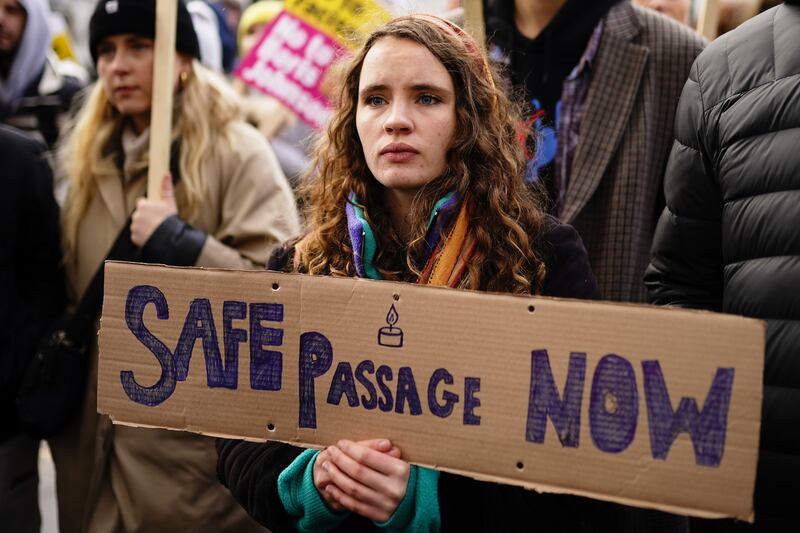A 25-year-old asylum seeker from Syria has been told by the Home Office that he can return from the UK to the war-torn country without "risk of serious harm".
The man, who has not been identified for safety reasons, fled Syria in 2017 to avoid forcible conscription into the national army, which was fighting various opposition factions throughout the country’s 10-year conflict.
The first known case of its kind in the UK echoes the controversial decisions taken by Denmark in recent months to try and repatriate refugees to what Danish authorities now deem a "safe" Syria.
According to reports from The Guardian, who have seen the refusal letter sent by the Home Office to the man, UK officials said there was no "reasonable degree of likelihood…. of persecution" if he returned to his home country.
The asylum seeker says he fled his home country "looking for safety" and that a return to Syria could very likely result in his detainment, arrest or death for having evaded conscription.
Last year, UN investigators said that tens of thousands of civilians were still missing after being detained arbitrarily during a decade of war in Syria.
Thousands more have been tortured or killed in custody, according to the report by the UN Commission of Inquiry on the Syrian Arab Republic detailing alleged war crimes and crimes against humanity by all parties.
A recent examination by Human Rights Watch of Syrian refugees who voluntarily returned to Syria between 2017 and 2021 found that they faced grave human rights abuses and persecution at the hands of Syrian government and affiliated militias, including torture, extra-judicial killings, and kidnappings.
The Home Office’s refusal letter said that it did not accept that the man would face a risk of persecution or real risk of serious harm on his return to Syria, The Guardian reported. An appeal of the decision is currently under way.
“I hope I will not be forced back to Syria. I am so tired of trying to find somewhere that I can be safe,” said the asylum seeker.
Campaigners for refugees say the decision "beggars belief" and urged the Government to show compassion and overturn its refusal.
“Frankly, if this Government is no longer granting sanctuary to Syrian refugees, who will it grant sanctuary to?” said Mariam Kemple Hardy of Refugee Action.
“This decision pulls up the drawbridge to those fleeing war and persecution. It fails to meet even the bare minimum anyone would expect of a Government claiming to uphold its obligations on the world stage,” the charity’s head of campaigns said.
The Home Office’s controversial decision to send the man back to Syria mirrors recent attempts by Denmark to do the same with hundreds of Syrian refugees who had sought shelter there during the war.
Last year, the Scandinavian nation was the first in Europe to declare Syria to be safe for refugees's return, prompting condemnation from international rights groups and protests in Denmark.
The UN’s refugee agency, the UNHCR, maintains that Syria is unsafe and that it will not facilitate mass returns without there being key protection conditions in place. An EU Parliamentary Resolution in March 2021 also reminded member states that Syria is not safe for refugees's return.
Hundreds of Syrians have had their residencies revoked by Danish immigration authorities who have concluded that "the current situation in Damascus is no longer such as to justify a residence permit or the extension of a residence permit" in Denmark.
In the absence of diplomatic ties between the two countries, Denmark cannot force Syrians to return meaning those people who do not have their residency renewed face the choice of either returning voluntarily or languishing in Danish detention centres, indefinitely.
The government's revocation of residencies has sparked outcry from human rights groups, who said Syria was not safe enough for people to return to.
London-based international law firm, Guernica 37, is working with Syrian families in Denmark affected by the “deeply concerning” decision.
Once lauded for its hospitality to migrants, Denmark has made stark moves towards an anti-immigration policy in recent years in a bid to appease increasingly influential far-right political parties.
The UK’s recent immigration policies have been moving in a similar direction.
Priti Patel’s new Nationality and Borders Bill, called the “anti-migrant” bill by activists, seeks to stem the numbers of asylum seekers into the country by criminalising people who arrive to the UK by unofficial channels.
The home secretary has also asked scientific advisers about using X-rays and other medical checks on asylum seekers to stop what she described as grown men “masquerading as children” on their applications.
Meanwhile, border officials in the UK are preparing to go on strike over the government’s plans to turn back dinghies in the English Channel, as controversy grows over government proposals for handling migrants.
The UK has never, until now, sought to return refugees who opposed the Syrian regime because of the dangers still present there.
This latest bid to return a young Syrian man to certain danger is one in a series of increasingly intimidating asylum policies that will undoubtedly serve to reduce what the home secretary calls the UK’s “pull factors.” However, it will also put to serious question “global Britain’s” role and responsibility in protecting the most vulnerable.







